|
|
|
Sort Order |
|
|
|
Items / Page
|
|
|
|
|
|
|
| Srl | Item |
| 1 |
ID:
146787
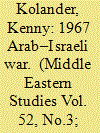

|
|
|
|
|
| Summary/Abstract |
This paper considers two aspects of historiography about the 1967 Arab–Israeli war – American and Soviet foreign policy in the region – to better appreciate the Soviet role in the outbreak of hostilities, as well as how the war concretized the USA–Israel ‘special relationship’ and weakened American–Arab relations. Relying especially on research from the Lyndon Johnson Presidential Library and Foreign Relations of the United States (FRUS), this paper argues that Soviet officials had little interest in pursuing measures to prevent war during the prewar crisis because the situation promised to undermine American interests in the region.
|
|
|
|
|
|
|
|
|
|
|
|
|
|
|
|
| 2 |
ID:
094152
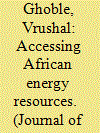

|
|
|
| 3 |
ID:
104786
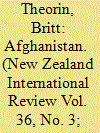

|
|
|
| 4 |
ID:
097122
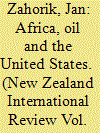

|
|
|
| 5 |
ID:
087661


|
|
|
|
|
| Publication |
2009.
|
| Summary/Abstract |
Why a combatant command for Africa? I argue that AFRICOM was formed to implement the U.S. national security strategy that seeks to strengthen states and eliminate ungoverned space, as well as establish relationships with African states that offer a means to greater state stability and foster economic development. In so doing, it counters global jihadist by denying them haven among weak governments or in ungoverned areas. It protects U.S. interests in resources by helping governments become more stable. And it competes with the Chinese approach that could worsen the status quo of ineffective states and ungoverned space. Indeed, the U.S. approach of increasing state effectiveness makes African countries less susceptible to the problems that may arise from the Chinese approach and so serves China's interests in access to natural resources.
|
|
|
|
|
|
|
|
|
|
|
|
|
|
|
|
| 6 |
ID:
140332
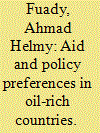

|
|
|
|
|
| Summary/Abstract |
This paper analyses the role of foreign aid in assisting development in two oil-rich countries: Indonesia and Nigeria. It seeks to understand the way foreign aid provided assistance to transform Indonesia from a ‘fragile’ state in the 1960s into one of the ‘Asian Tigers’ in the mid-1990s, and why it did not prevent Nigeria from falling into ‘African Tragedy’. The paper argues that foreign aid may help not only to finance development, but also to navigate policy makers’ policy choices. It shows how foreign aid may or may not help policy makers turn their policy preferences into action.
|
|
|
|
|
|
|
|
|
|
|
|
|
|
|
|
| 7 |
ID:
145008
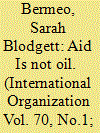

|
|
|
|
|
| Summary/Abstract |
Recent articles conclude that foreign aid, like other nontax resources, inhibits political change in authoritarian regimes. This article challenges both the negative political effects of aid and the similarity of aid to other resources. It develops a model incorporating changing donor preferences and the heterogeneity of foreign aid. Consistent with the model's predictions, an empirical test for the period 1973–2010 shows that, on average, the negative relationship between aid and the likelihood of democratic change is confined to the Cold War period. However, in the post–Cold War period, nondemocratic recipients of particular strategic importance can still use aid to thwart change. The relationship between oil revenue and democratic change does not follow the same pattern over time or across recipients. This supports the conclusion that aid has different properties than other, fungible, resources.
|
|
|
|
|
|
|
|
|
|
|
|
|
|
|
|
| 8 |
ID:
032107
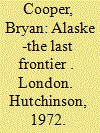

|
|
|
|
|
| Publication |
London, Hutchinson, 1972.
|
| Description |
248p.: ill., maps, chartshbk
|
| Standard Number |
0091109701
|
|
|
|
|
|
|
|
|
|
|
|
Copies: C:1/I:0,R:0,Q:0
Circulation
| Accession# | Call# | Current Location | Status | Policy | Location |
| 010304 | 979.8/COO 010304 | Main | On Shelf | General | |
|
|
|
|
| 9 |
ID:
119664
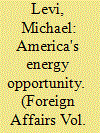

|
|
|
|
|
| Publication |
2013.
|
| Summary/Abstract |
The U.S. energy revolution is not confined to a single fuel or technology: oil and gas production, renewable energy, and fuel-efficient automobile technologies all show great promise. To best position the country for the future, U.S. leaders should capitalize on all these opportunities rather than pick a favorite; the answer lies in 'most of the above.'
|
|
|
|
|
|
|
|
|
|
|
|
|
|
|
|
| 10 |
ID:
151378


|
|
|
| 11 |
ID:
107941
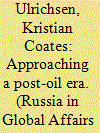

|
|
|
| 12 |
ID:
106872
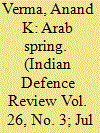

|
|
|
| 13 |
ID:
041274


|
|
|
|
|
| Publication |
London, Weidenfeld and Nicolson Ltd., 1980.
|
| Description |
ix, 530p.
|
| Standard Number |
0297777599
|
|
|
|
|
|
|
|
|
|
|
|
Copies: C:1/I:0,R:0,Q:0
Circulation
| Accession# | Call# | Current Location | Status | Policy | Location |
| 019320 | 338.953/KEL 019320 | Main | On Shelf | General | |
|
|
|
|
| 14 |
ID:
132327
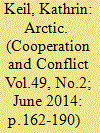

|
|
|
|
|
| Publication |
2014.
|
| Summary/Abstract |
Neorealist and neoliberal institutionalist explanations for the state and future of the Arctic region dominate the Arctic debate in international relations. While both schools focus on different aspects concerning the current and future state of Arctic affairs - neorealism evokes a confrontational rush for the Arctic's resources, whereas neoliberal institutionalism propagates the necessary reform of the institutional system governing Arctic issues - both share the underlying assumption of significant and rising stakes towards Arctic commodities. However, this article argues that this debate has hitherto failed to substantiate the actual stakes of the main actors involved. Consequently, many studies make grandiloquent statements about prospects of cooperation and conflict and the appropriate institutional framework for the Arctic region, based on only limited empirical support. This article aims to fill this gap by analysing the Arctic oil and gas interests of the five Arctic littoral states (Russia, USA, Canada, Norway and Denmark/Greenland). The analysis shows greatly different levels of interests towards the High North among the Arctic states. The findings make it possible to make more credible statements about the likelihood of confrontation over Arctic resources and necessary institutional adjustments. The evidence shows that the often-evoked issue of geopolitical rush for Arctic resources is unlikely to eventuate. Nonetheless, there remain institutional challenges for the protection of the fragile Arctic ecosystem.
|
|
|
|
|
|
|
|
|
|
|
|
|
|
|
|
| 15 |
ID:
126099
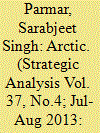

|
|
|
|
|
| Publication |
2013.
|
| Summary/Abstract |
Changes in the Arctic topography due to climate change have resulted in the region, which erstwhile was remote with little accessibility, to being accessible with potential natural resources and attractive navigable sea areas. The prospects have also influenced the strategic contours of the Arctic and brought in many actors that view the region as a resource-rich area with viable commercial interests. The Arctic attraction has gained significance as an economic goldmine with estimates indicating the region to hold about 22 per cent of the undiscovered, technically recoverable resources in the world. The approximate breakdown as per a US Geological Survey report is about 13 per cent of the undiscovered oil, 30 per cent of the undiscovered natural gas, and 20 per cent of the undiscovered natural gas liquids in the world. About 84 per cent of the estimated resources are expected to occur offshore.
|
|
|
|
|
|
|
|
|
|
|
|
|
|
|
|
| 16 |
ID:
119857
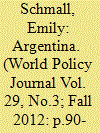

|
|
|
|
|
| Publication |
2012.
|
| Summary/Abstract |
Chubut, Argentina-In mid-June, at the onset of winter in the Southern Hemisphere, a gang of burly, masked construction workers took over Cerro Dragón, an oil and gas field 15 times the size of Buenos Aires and Argentina's most important source of hydrocarbons. Some 500 members of a union nicknamed the Dragons wrecked offices, spray-painted seditious messages on buildings, and barricaded access routes with torched cars in a scene Pan American Energy's chief executive Oscar Prieto compared to battle-scarred Baghdad. The disarray forced Pan American-majority-owned by oil giant BP, with China's CNOOC holding a 20 percent share-to halt production in the field for the first time in its more than 50 years of operations. The threat was calculated to irk a government already spending heavily on imported energy and that has demonstrated its willingness to take over companies.
|
|
|
|
|
|
|
|
|
|
|
|
|
|
|
|
| 17 |
ID:
123594
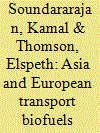

|
|
|
|
|
| Publication |
2013.
|
| Summary/Abstract |
Over the past decade, both Asia and Europe have devoted considerable effort to expanding the production of first-generation biofuels to fuel cars, taxis, buses, trucks, motorcycles, etc. On the one hand, with "peak oil" potentially looming in the future, and on the other, with an insatiable need for petroleum and diesel, the prospect of large-scale use of biofuels enjoyed tremendous public appeal as they seemed to provide a long-term alternative and clean fuel source in Asia and Europe. However, globally today, biofuels constitute only 3 % of the total transport fuel mix. Production is still steadily increasing in some countries, but their economic competitiveness and environmental sustainability have come into question in others with the result that production has slowed down considerably or even halted. The outlook for second- and third-generation biofuels is promising. However, they also cannot yet supplement, far less substitute, for petroleum and diesel in a commercially viable way.
|
|
|
|
|
|
|
|
|
|
|
|
|
|
|
|
| 18 |
ID:
184390


|
|
|
|
|
| Summary/Abstract |
Systemic shift, in which the weight of the global economy has shifted away from the Euro-Atlantic eastwards, is increasingly underlined by what is referred to here as the ‘Asianisation of Asia'. Asianisation is a process in which Asia's diverse regions steadily converge around shared economic agendas. Japan, followed by the so-called ‘Asian Tigers’, were the pioneers of the Asian process, which began in earnest in the mid-1960s. China and India, drivers of the pre-modern world economy, are emulating the strategies of the early Asianisers this century and are building parallel pan-Asian relations of their own. Nowhere is this more evident, and indeed significant, than in relation to China and Iran, the Asianisers par excellence. Their relations are arguably critical to the process, a process which is infused with the legacy and their collective memories of the ancient Silk Road which had shaped pan-Asian relations for centuries before the rise of European power.
|
|
|
|
|
|
|
|
|
|
|
|
|
|
|
|
| 19 |
ID:
118773
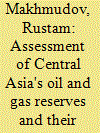

|
|
|
| 20 |
ID:
030595


|
|
|
|
|
| Edition |
8th ed.
|
| Publication |
London, Methuen and Co. Ltd, 1987.
|
| Description |
216p.;mapsHbk
|
| Contents |
Includes Index.
|
| Standard Number |
0416011721
|
|
|
|
|
|
|
|
|
|
|
|
Copies: C:1/I:0,R:0,Q:0
Circulation
| Accession# | Call# | Current Location | Status | Policy | Location |
| 028281 | 911/BOY 028281 | Main | On Shelf | General | |
|
|
|
|
|
|
|
|
|